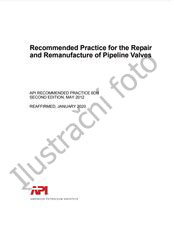Potřebujeme váš souhlas k využití jednotlivých dat, aby se vám mimo jiné mohly ukazovat informace týkající se vašich zájmů. Souhlas udělíte kliknutím na tlačítko „OK“.

API TR 13TR1-ed.1
Stress Corrosion Cracking of Corrosion Resistant Alloys in Halide Brines Exposed to Acidic Production Gas
Přeložit název
NORMA vydána dne 1.7.2022
Informace o normě:
Označení normy: API TR 13TR1-ed.1
Datum vydání normy: 1.7.2022
Kód zboží: NS-1140680
Počet stran: 51
Přibližná hmotnost: 153 g (0.34 liber)
Země: Americká technická norma
Kategorie: Technické normy API
Anotace textu normy API TR 13TR1-ed.1 :
API TR 13TR1, 1st Edition, November 2017 - Stress Corrosion Cracking of Corrosion Resistant Alloys in Halide Brines Exposed to Acidic Production Gas
The annular space between the production tubing and the carbon steel casing is filled with a dense fluid, typically a halide salt. In wells with corrosion resistant alloy (CRA) tubing, SCC of the CRA tubing OD or auxiliary components has occurred in a number of wells. Halide brines have densities up to 2.2 g/ml (19.2 lb/gal or ppg) and contain a number of additives. A previous publication linked some field failures to the addition of SCN-corrosion inhibitor. [1]
Additional field failures in CaCl2 brines have been linked to ingress of acidic gas containing CO2 and H2S and to exposure to air. SCC of martensitic stainless steel (SS), (13 % Cr, 6 % Ni, 2 % Mo) was attributed to downhole leakage of acidic gas [2], whereas SCC of a duplex SS tubing (25 % Cr, 3 % Mo) was attributed to air in the gas cap above column of brine. [3]
To understand the effects of brine compositions on the CRAs, a joint industry project was formed under the auspices of the American Petroleum Institute (API). It has been known as the CRAs in Brine Testing Program. Under its auspices, work has been underway for a number of years on understanding the interaction of brine chemistry and CRAs.
This technical report evaluates the SCC risks of a range of CRAs in various halide brine compositions for the case of exposure to acidic production gas (CO2+H2S). Also evaluated are SCC risks due to air exposure. However, the testing became focused on a group of martensitic stainless steels alloyed with Ni and Mo, that are collectively referred to as modified 13Cr martensitic SS, or alternatively in some publications as super (S13Cr) martensitic SSs. Most tests evaluated the as-received brine, excluding proprietary additives such as corrosion inhibitor or oxygen scavengers. For completeness and comparison, test results provided by member companies in the API program or in the publications are cited; these test protocols may be different from those in the API test protocols hence, where that occurs, significant differences are noted. Test results are summarized in a tabular format with color coding to designate passing or failing test results in Annex C of this technical report.
Doporučujeme:
Aktualizace zákonů
Chcete mít jistotu o platnosti užívaných předpisů?
Nabízíme Vám řešení, abyste mohli používat stále platné (aktuální) legislativní předpisy.
Chcete vědět více informací? Podívejte se na tuto stránku.



 Cookies
Cookies
